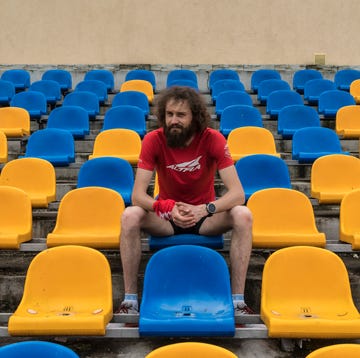In our marriage, running had always been my thing. During my 11 years with Julie, I'd logged probably 15,000 miles. I'd completed 30 marathons and scores of shorter races. My wife, on the other hand, had gone jogging exactly once in that time.
Early in our courtship, we'd headed out on what was supposed to be a two-mile jaunt, but an overly ambitious pace and torrential rain had sabotaged the workout. After that, Julie relegated her fitness efforts to walks and visits to the gym.
But that all changed in the last year, when Julie embraced running wholeheartedly. Oddly enough, this transformation happened almost precisely at the same moment our marriage began to dissolve.
I was not prepared for the collapse of our relationship. Maybe it was the rut of work and kids' soccer games and every Saturday morning at the bookstore together, but everything seemed so solid to me. But what I had seen as stability, Julie viewed as emptiness.
As we tried to work through our problems, Julie's workouts grew longer, more intense. Her walks became walk-runs, then run-walks. The worse things grew between us, the greater the effort Julie seemed to pour into her workouts. "I need to get my run in," she'd say, and it was as if I was hearing my own voice. Perhaps I was imagining it, but it seemed that the longest runs came on the mornings after our counseling sessions. I was running more, too. Running was the only anchor I had left, and I was clinging to it for dear life. It was the only thing that made me feel good about myself. But though our lives were moving in parallel, we'd lost what had once connected us.
The Saturday before Labor Day, we woke early. "There's a 5-K this morning," I said to her as we lay in bed, a gulf of mattress between us. "You should do it."
She protested that she wasn't ready, that she'd never run three miles without stopping. I told her about my first race, when I had to have my mother measure my running route with our old Plymouth Valiant to see if I could make it an entire five kilometers without collapsing. Julie laughed.
Two hours later, I sat with our two sons by the race's final straightaway. Right around the 29-minute mark, Julie turned the corner. She was moving faster than I'd ever seen her go. Her blond hair was matted with sweat, her cheeks flushed from the effort. The boys and I screamed our lungs out as she passed us and two other runners. She drove for the line, racing to cross under 30 minutes. I could feel my whole body tense, my heart quicken, like it was me out there.
I didn't cry. But I could feel the tears pushing to get out. In these days when we'd decided we had too little to share, we'd found new common ground. Julie was a runner. Just like me.
Still, it couldn't save our marriage.
A month later, I moved out and started piecing together a new life. I bought a frying pan. I found new running routes. Julie and I split time with the kids.
In the time since we've been separated, Julie has turned 40. I swung by our old house the night of her birthday, knowing that she would be out to dinner with the kids. I'd planned to leave a gift on the doorstep, with a card. Only problem was, I had no idea what to write. I sat in the driveway, staring at the card's empty, white midsection. A minute became five. Still the right words wouldn't come. Finally, I just wrote: "Happy 40th birthday. I wish nothing but the best for you." Far from perfect, but it would have to do. Now all I had to do was close the deal.
"I'm sorry"? Too apologetic. "I love you"? Too pathetic. "Have a great life without me"? Too nasty. And then it came to me. In careful block letters I wrote: "Keep running."
Separate Ways
Running in the Cold.
Watch Next

Advertisement - Continue Reading Below

She Raced 18 Horses in an Ultramarathon—and Won

Published: May 02, 2008 12:00 AM EDT

Running Was His Life. Then Came Putin’s War.

Running in the Cold
Advertisement - Continue Reading Below
Advertisement - Continue Reading Below







